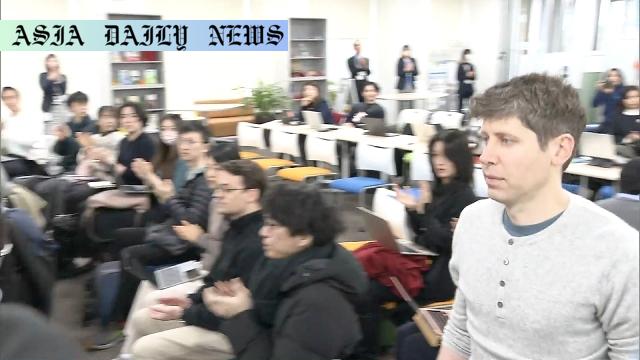OpenAI CEO Sam Altman inspires students with bold steps toward open-source AI and the future of education during visit to Japan.
OpenAI CEO Sam Altman revealed plans to make certain AI models open source.
Altman emphasized AI’s potential to transform education globally.
He discussed the safety and robustness of open-source AI models.
University of Tokyo students expressed excitement and inspiration from Altman’s visit.

OpenAI CEO Sam Altman’s Vision for Open-Source AI
During a visit to the University of Tokyo, OpenAI CEO Sam Altman provided a glimpse into the company’s evolving philosophy about artificial intelligence (AI). Speaking to an audience of approximately 30 students, Altman articulated OpenAI’s commitment to making strides toward open-sourcing its powerful AI models. While questions about full implementation details and timelines remain unclear, Altman affirmed, ‘We’re going to do it.’ This statement showcases OpenAI’s willingness to take significant steps in democratizing access to advanced AI technologies, fostering inclusivity and innovation worldwide.
How OpenAI Prioritizes Safety and Robustness in AI Models
Altman did not shy away from discussing the challenges associated with open-sourcing advanced AI models. He highlighted that OpenAI has been prioritizing the safety and robustness of its algorithms so they remain beneficial, even post-open-sourcing. By recognizing this dimension of responsibility, OpenAI seeks to balance accessibility with ethical implementation, both crucial in preventing the misuse of transformative technologies like ChatGPT.
Revolutionizing Education: OpenAI’s Long-Term Goals
A significant portion of Altman’s conversation with the students focused on education — an area he described as a priority for OpenAI. He sees AI as a tool that could reshape global educational paradigms by enabling tailored learning experiences for individuals. In his own words, every student could enjoy a ‘better educational experience,’ where AI technologies adapt to their learning styles and address personal weaknesses effectively. While Altman acknowledged the unpredictable nature of educational developments a century ahead, he expressed optimism that the future would be vastly different and better equipped for fostering knowledge.
Student Engagement and Shared Optimism
The students reciprocated Altman’s enthusiasm with their own aspirations and inquiries. One student pondered how to effectively bridge AI technologies with her own intellectual capabilities, while others brought up comparisons with Chinese open-source AI efforts, such as DeepSeek. Altman nodded to these concerns, agreeing that greater openness could fuel competition and cooperation across borders. Encouragingly, the participants expressed a sense of inspiration and motivation following the Q&A session, which demonstrated Altman’s ability to connect authentically with the next generation of technology leaders.
Looking Ahead: The Positive Impact of OpenAI’s Open Models
The commitment to making parts of OpenAI’s models open source represents a pivotal shift for the company. By taking a more collaborative approach, OpenAI looks to empower innovators globally while simultaneously addressing concerns about AI safety and misuse. Altman’s insights sparked hope among University of Tokyo students and broader audiences for a harmonious blend of cutting-edge innovation and societal benefit. With OpenAI at the helm of this transformation, humanity stands to benefit from more transparent, inclusive, and impactful AI-driven solutions.
Commentary
A New Horizon for Open-Source AI
OpenAI CEO Sam Altman’s recent announcement about plans to open-source parts of their artificial intelligence models has stirred excitement for proponents of accessible and transparent innovation. Making AI technologies available to the public is a bold and commendable move, as it fosters creativity and collaboration across the engineering and research spectrum. Altman’s leadership in this regard demonstrates not only a commitment to progress in AI but also a recognition of the power of shared ingenuity.
Balancing Accessibility with Safety
Of course, with great opportunity comes great responsibility. By opening up their models, OpenAI faces challenges in maintaining safety and ensuring their technologies are not misused. Altman’s remarks about focusing on robustness and security reflect the right priorities, as they underscore the ethical considerations a truly global AI company must address. Uplifting communities without enabling harmful practices is a fine line, but one that is critical to the larger vision of responsible AI development.
AI and the Potential for Transforming Education
What makes this development even more inspiring is the emphasis on education. Altman’s belief that every student could find personalized learning programs through AI technologies is revolutionary. Imagine a world where students, regardless of socioeconomic or geographic barriers, can access tools that address their exact learning needs. It’s a vision that not only democratizes education but also holds the potential to cultivate a generation of highly skilled, innovative problem-solvers.
In all, Altman’s comments underscore the immense promise of AI technologies in reshaping industries for the better. While hurdles persist, the trajectory of OpenAI toward open-source initiatives and its broader impacts on education and innovation suggest a brighter, more inclusive future is within reach.


